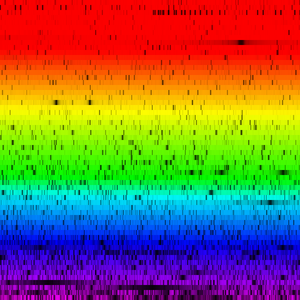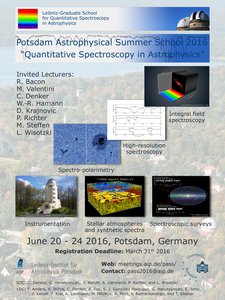Leibniz Graduate School for Quantitative Spectroscopy in Astrophysics

The spectrum of the Sun.
Credit: AIPThe Leibniz Graduate School for Quantitative Spectroscopy in Astrophysics was a collaborative project of the Leibniz Institute for Astrophysics Potsdam (AIP) and the Institute of Physics and Astronomy of the University of Potsdam (UP) and had started in 2013.
The Graduate School provided a comprehensive and integrative research and training environment for young scientists both at AIP and UP, promoting the application of spectroscopic methods to cutting-edge astrophysical research topics. AIP and UP both have a broad research profile within astrophysics, reaching from solar and planetary physics via stellar and extragalactic research to cosmology. In this diversity, the development of new instruments and methods for spectroscopy forms a common denominator for many of the astrophysical research activities in Potsdam.
The Graduate School connected to and built upon this characteristic portfolio. By focussing on the "quantitative" aspects of astrophysical spectroscopy, we expressed our ambition to go beyond "descriptive" astronomy (which nevertheless has its merits) and to promote the advancement of a physical understanding of cosmic objects. While the Graduate School was motivated by an observational approach and by new observational opportunities, an essential element in the proposed research was the quantitative comparison with theoretical predictions and models.

The Potsdam Astrophysical Summer School 2016 was dedicated to the topic "Quantitative Spectroscopy in Astrophysics".[Meeting website]
The characteristic feature of the Graduate School was its seamless combination of training on the relatively broad subject of spectroscopy with research on highly specialized scientific questions. Key components were supervision through thesis committees, mentoring by senior students, joint colloquia, and dedicated teaching and training courses covering scientific topics as well as soft skills. These activities were open to all PhD students in Astrophysics (AIP/UP/DESY Zeuthen) to encourage a lively exchange and discussions beyond the individual research project. The framework of the Graduate school also allowed to explore further specific measures for a structured doctoral training program. Among these major training elements of the Graduate School are incoming and outgoing internships: (1) A summer research fellowship program invited (international) undergraduate students for 12 weeks to work with the doctoral students on a well-defined aspect of their research projects. (2) The doctoral students worked with senior scientists at institutions outside of Germany, who could add additional expertise to the thesis projects. The overall goal of the Graduate School was thus to contribute to the education of the next generation of young scientists that is well-positioned to face the upcoming challenges within science, academia, and industry.
Contacts were apl. Prof. Dr. Carsten Denker (AIP, Chair), Prof. Dr. Philipp Richter (UP, Co-Chair), Prof. Dr. Lutz Wisotzki (AIP, Co-Chair) and Dr. Adriane Liermann (Coordinator, previously also at AIP).